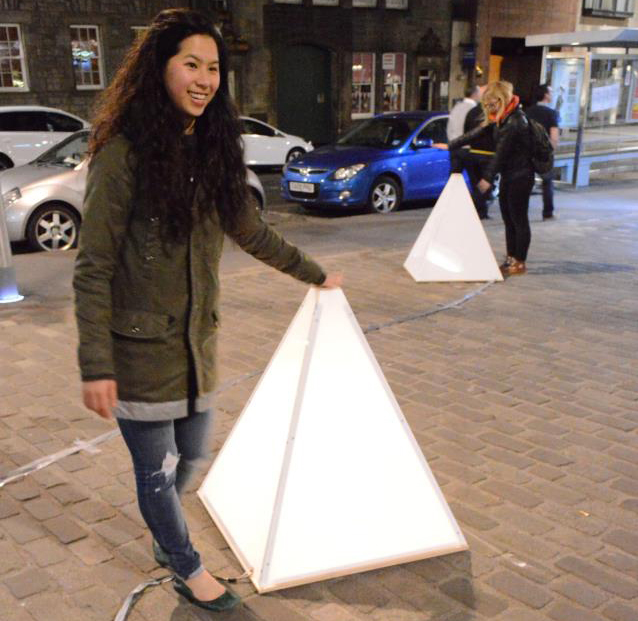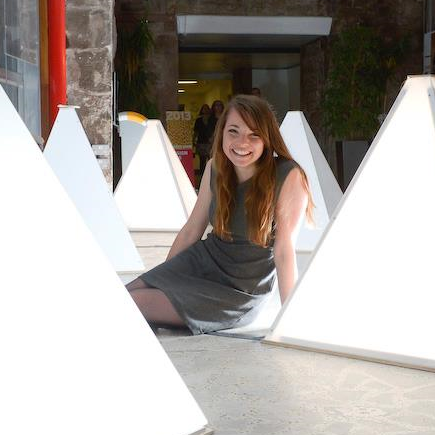Every year artists from all over the world come to u19 CREATE YOUR WORLD Festival to show us their ideas, try them and also get inspired to do new Projects. Interaction artist Rebecca Gischel shows the installation Global Sounds and writes about her works and the ideas behind them.
A while ago, I decided to pack up and move to Edinburgh. What fascinated me was the city’s cultural diversity and openness. One evening, a friend of mine—a woman originally from China—asked what home actually meant to me and I was unable to give her a clear answer. Is my home in Germany or is it in Edinburgh?
That conversation really got me thinking. I began to consider migrants and their home. They live in a new city, in a new country, and maybe even in a new culture, and they nevertheless carry with them memories of their country of origin. I regard migrants as enrichments of a culture since, along with these things they recall, they also bring parts of their culture, interests and ideas to their new homeland.

These thoughts formed the basis of my latest art project, Global Sounds. My aim was to set up an interactive projection in a public space to deal with migration and home. The installation consists of seven pyramids, each representing a different culture. Composer Theresa Zaremba created a song played by seven instruments from different cultures—for instance, the didgeridoo from Australia and the djembe from Africa. The installation’s pyramids are interactive—passers-by can contribute one of the seven instruments as well as light to the installation by standing next to one of the pyramids. The idea behind this is that the more people come together, the more interesting the composition becomes.
Global Sounds 2013 from Rebecca Gischel on Vimeo.
Webcams mounted on the tips of the pyramids activate the instruments and the bulbs inside the pyramids. I used Processing and Arduino software for the programming.
But Global Sounds isn’t the first cultural project that was inspired by my interaction with friends from other cultures. The idea for my Black Box project was the upshot of a discussion of current political events with friends from China and Greece. We realized that some our views on political and social issues differed considerably, and that this was due to our different sources of information. We are all regular readers of online newspapers based in our respective homelands.
The resulting project was an expression of social criticism: pointing out the media’s influence on our opinions. It calls into question the freedom of one’s own opinion, and puts forth the hypothesis that, due to influence exerted by the media, the subjectively correct opinion in each country can be a different one.

Black Box offers an ironic solution to the resulting problem of harmonious smalltalk. The black box—configured with Arduino—provides the user with the right opinion, which is delivered directly and discreetly via earpod. Users can thus calibrate their point of view on a topic to the opinion prevailing in a particular region. For instance, when a European businessman travels to the USA, an American opinion guarantees a pleasant conversation.
Plus, users can select the official opinion or public opinion. Official opinion is the result of newspaper articles and statements by government officials, whereas public opinion is a composite of tweets on the subject by some unidentified individuals online. Nevertheless, the user might be in for a disappointment if he/she opts for public opinion in China.
Is my opinion right? Is your opinion wrong? Or did we simply form them from different sources of information?
A less socially critical project, though one that also has a sociological background, is Leistungszeit (achievement time). In these times in which burn-out is no longer a rare occurrence, I address the way people deal with time. Should we be using time? Or perhaps spending it would be preferable?
Leistungszeit was implemented with an XBox Kinect and the support of programmer Menno Kuyper. It puts thoughts about dealing with time “into the minds” of passers-by, who can either accept them or erase them, whereupon the diametrically opposed thought appears. This project was designed to encourage people to reflect on how they use their time.
Leistungszeit from Rebecca Gischel on Vimeo.
I’ve yet to come up with just the right idea for my next art project but I’m pretty sure that interesting conversations will provide the inspiration for it. Stop by and check out “Global Sounds” at the festival in Linz, and maybe we can chat!
_______________________________________________________________________________________
Rebecca Gischelwas born in 1989 in Germany and studied media design at DHBW Ravensburg. During a semester abroad at Napier University in Edinburgh, she discovered her love for interactive art. After graduating, she moved to Edinburgh in 2012 and enrolled in the Master’s Program in Interaction Design at Napier University. She proceeded to discover Processing and Arduino for the production of interactive art projects. Her focus is on interactive art in public spaces as a means of addressing sociological issues.
